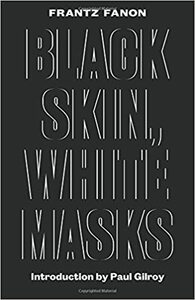Take a photo of a barcode or cover
challenging
reflective
slow-paced
challenging
emotional
informative
slow-paced
I don't really think my way of reviewing is right for how I feel about this book, so I won't give it a star rating. My main response is that we should be reading this in school, because of all the reading I've read on race, this is the book that has made me realise my privilege in never having to battle against internalised negative understandings of my self. Fanon writes so clearly and has a true talent in his ability to show the reader exactly what he means. My one frictious moment with it was when Fanon talks about women. I know the book has had feminist criticisms, and I agree that he fails to voice, or recognise, the additional gendered insecurities black women face. I'd be really interested to hear other people's thoughts on this.
Also, as I read this the analysis of other texts meant I wished I had read them to understand Fanons arguments better. I'll be returning to it when I have. It's a powerful book. I only wish I had read the version with an introduction by Paul Gilroy.
informative
inspiring
medium-paced
Another book I read for class that I really enjoyed. Fanon's narrative showed me a whole other perspective that I would otherwise not have known about. I enjoy expanding my knowledge on how people who are different than me think and feel on certain subjects, and Fanon's work is definitely a must read as far as that goes. The only parts I really don't connect with are Fanon's views of women and gay men. The man is very misogynistic and homophobic. It's gross, and the reason behind my two star deduction.
challenging
medium-paced
Graphic: Misogyny, Racism, Xenophobia
Moderate: Sexism
Minor: Pedophilia, Religious bigotry
challenging
informative
reflective
slow-paced
This is mainly interesting as a foundational text to look at later writers. The idea that a Black child in a primarily Black space reads European books and sees himself in the white hero, only "becoming" Black after travelling to Europe and being seen as such there, as well as the ways racial hierarchies are artificially constructed are articulated in a compelling way, but the content is so dense (there is a lot of random poetry analysis) or dated (Freudian analysis, misogyny, homophobia) that it's hard to recommend to a "lay" reader.
Graphic: Misogyny, Racial slurs, Racism
Moderate: Homophobia, Rape, Slavery
Whether we like it or not, discussions of racial division in western civilization frequently translate into dualities: evil and good, inferiority and superiority, black and white. Our history was built upon the myth of Blacks as representatives of evil; a lie our forebearers told themselves to shackle, subjugate, and disenfranchise human-beings that looked unlike themselves. If the Black man was seen as savage, the white man considered himself civilized. Where the Black woman was deemed primitive, the white woman anointed herself sophisticated. We often speak upon these noxious creeds as the manifestation of a perceived white superiority that white people will often swear has come and passed, but if such fictions were accepted by whites then, Frantz Fanon created a guide to how Blacks suffered through their apparent inferiority.
Fanon employed his background as a psychiatrist to delve into the psyche of his fellow Antilleans living on the Caribbean island of Martinique in the 1950s, a Petri dish for how experienced racism doled out by white people completely shatters the mental well-being of Blacks. As such, Fanon’s observations continue to be applicable to this day as we continue to be at war with racism in the west, which is admittedly frightening. It is frightening not only because we have failed to enlighten ourselves enough to eradicate such repressive doctrines a near generation later, but because of what Fanon’s writings say about the consequences racism, both prejudicial and systemic, can have on mental health and self-worth.
Fanon asks us to carefully consider the mind-state of an Antillean (a Black man) living in Martinique (a French colony, a white man’s world). Every waking moment, he is told that he is a monster, a rapist, an idiot, and an odious dark mark on society. While he endures this incessant abuse, he is also struggling to get by as he does not get to enjoy the rights and privileges his fellow island dwellers do because he is Black and they are white. The system in Martinique has literally been designed to make him the lesser and they the greater. Everyday, he is taught that he is evil and the white man is pure. Everyday he goes through this, until the weight of the situation creates cracks in his psyche. If the white man won’t recognize him as human, he will make the white man recognize him by becoming white himself. He will dress like the white man, talk like the white man, and love like the white man until the white man sees that he, the Black man, is white, or rather, human. The white man’s societal imposition is a resounding success; he has fooled the Black man into playing by his rules and he will always be several rungs ahead.
Of all of Fanon’s arguments, I find this one to be the most important and essential to carry with us as we move forward. That said, the book itself is incredibly problematic for its dismissive, misogynistic treatment of black women. Fanon points to black women’s alleged attempts to secure relationships with white men in order to legitimize themselves, and I cringe at Fanon’s suggestion that a woman can only find worth through a man. The book also has trouble staying on topic, drowning underneath tangents, poems, and anecdotes. Fanon spends a great deal of time pulling from the theories of such celebrated intellectuals as Hegel, Sartre, and Freud, criticizing what he sees as slippery slopes to racism in their thinking. Sometimes, the criticisms are on point. Other times, I wonder why they’re brought up at all.
This is by no means a work that stands tall as a whole, but for some of the points it makes, we are better armed in fighting for a world that recognizes a long rejected truth: Black lives matter.
Fanon employed his background as a psychiatrist to delve into the psyche of his fellow Antilleans living on the Caribbean island of Martinique in the 1950s, a Petri dish for how experienced racism doled out by white people completely shatters the mental well-being of Blacks. As such, Fanon’s observations continue to be applicable to this day as we continue to be at war with racism in the west, which is admittedly frightening. It is frightening not only because we have failed to enlighten ourselves enough to eradicate such repressive doctrines a near generation later, but because of what Fanon’s writings say about the consequences racism, both prejudicial and systemic, can have on mental health and self-worth.
Fanon asks us to carefully consider the mind-state of an Antillean (a Black man) living in Martinique (a French colony, a white man’s world). Every waking moment, he is told that he is a monster, a rapist, an idiot, and an odious dark mark on society. While he endures this incessant abuse, he is also struggling to get by as he does not get to enjoy the rights and privileges his fellow island dwellers do because he is Black and they are white. The system in Martinique has literally been designed to make him the lesser and they the greater. Everyday, he is taught that he is evil and the white man is pure. Everyday he goes through this, until the weight of the situation creates cracks in his psyche. If the white man won’t recognize him as human, he will make the white man recognize him by becoming white himself. He will dress like the white man, talk like the white man, and love like the white man until the white man sees that he, the Black man, is white, or rather, human. The white man’s societal imposition is a resounding success; he has fooled the Black man into playing by his rules and he will always be several rungs ahead.
Of all of Fanon’s arguments, I find this one to be the most important and essential to carry with us as we move forward. That said, the book itself is incredibly problematic for its dismissive, misogynistic treatment of black women. Fanon points to black women’s alleged attempts to secure relationships with white men in order to legitimize themselves, and I cringe at Fanon’s suggestion that a woman can only find worth through a man. The book also has trouble staying on topic, drowning underneath tangents, poems, and anecdotes. Fanon spends a great deal of time pulling from the theories of such celebrated intellectuals as Hegel, Sartre, and Freud, criticizing what he sees as slippery slopes to racism in their thinking. Sometimes, the criticisms are on point. Other times, I wonder why they’re brought up at all.
This is by no means a work that stands tall as a whole, but for some of the points it makes, we are better armed in fighting for a world that recognizes a long rejected truth: Black lives matter.
challenging
emotional
informative
reflective
medium-paced
challenging
informative
reflective
A little outdated but still a good read regarding race theory and the evolution of ideas surrounding it.








